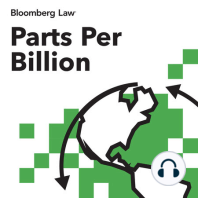9 min listen

Energy Infrastructure Now More Impervious to Activists
Energy Infrastructure Now More Impervious to Activists
ratings:
Length:
18 minutes
Released:
May 2, 2022
Format:
Podcast episode
Description
It's never easy for environmental activists—whether global, national, or local—to stop the construction of a big energy infrastructure project. But now, it may be nearly impossible.
For an example, look to southwestern Louisiana. Fossil fuel companies are building new liquefied natural gas terminals there as fast as they can, with explicit approval from a Biden administration that desperately wants to replace Russian's energy dominance overseas. And these terminals are being built in an economically depressed region where fossil fuel jobs can represent a ray of light.
Against these types of headwinds, what's an activist supposed to do?
That's the topic of discussion on today's Parts Per Billion, our weekly environmental podcast. Bloomberg Law's Daniel Moore traveled to Louisiana and talked to residents living near current and future LNG terminals about how the facilities are affecting the Gulf Coast's environment. And Daniel explains why advocates for renewable energy there are having a tough time making their case in the current economic and geopolitical climate.
Do you have feedback on this episode of Parts Per Billion? Give us a call and leave a voicemail at 703-341-3690.See omnystudio.com/listener for privacy information.
For an example, look to southwestern Louisiana. Fossil fuel companies are building new liquefied natural gas terminals there as fast as they can, with explicit approval from a Biden administration that desperately wants to replace Russian's energy dominance overseas. And these terminals are being built in an economically depressed region where fossil fuel jobs can represent a ray of light.
Against these types of headwinds, what's an activist supposed to do?
That's the topic of discussion on today's Parts Per Billion, our weekly environmental podcast. Bloomberg Law's Daniel Moore traveled to Louisiana and talked to residents living near current and future LNG terminals about how the facilities are affecting the Gulf Coast's environment. And Daniel explains why advocates for renewable energy there are having a tough time making their case in the current economic and geopolitical climate.
Do you have feedback on this episode of Parts Per Billion? Give us a call and leave a voicemail at 703-341-3690.See omnystudio.com/listener for privacy information.
Released:
May 2, 2022
Format:
Podcast episode
Titles in the series (100)
Confirming All of the Presidents Men by Parts Per Billion